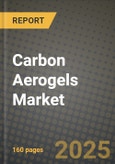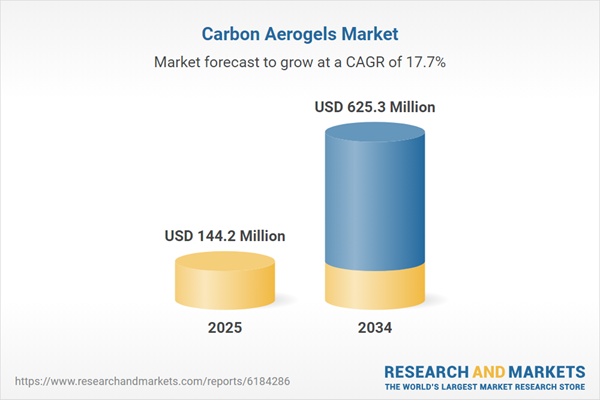Carbon Aerogels Market
Carbon aerogels are ultra-low-density, high-surface-area porous carbons produced by sol-gel routes (resorcinol-formaldehyde, phenolic, melamine, polyimide, biomass precursors) followed by supercritical or atmospheric drying and carbonization/activation. Tunable properties - pore size distribution, electrical conductivity, thermal conductivity, compressive modulus, and surface chemistry - enable use across energy storage (double-layer and hybrid supercapacitors, Li-ion/S, Na-ion hosts), thermal management and insulation (cryogenic tanks, battery packs, HVAC), EMI shielding and lightweight structural damping, catalysis and gas separation, environmental remediation (oil/organics adsorption), and defense/aerospace stealth and thermal signatures. Trends include transition from monoliths to flexible felts, papers, and beads for scalable handling; roll-to-roll carbon aerogel papers for electrodes and heat spreaders; hybridization with graphene, CNTs, MXenes, silica or ceramic backbones for mechanical robustness; and binder-free electrodes to cut interfacial resistance. Demand drivers are electrification (fast-charge buffering, high-power hybrid storage), battery safety/thermal runaway mitigation, lightweighting in aerospace and mobility, cryogenic insulation for LNG and hydrogen value chains, and stringent EMI/thermal requirements in electronics. Challenges remain around cost (precursors, drying, cycle time), yield variability, dust control, and machining/lamination for consistent module integration. The competitive landscape spans specialty aerogel producers, advanced carbons firms, thermal-insulation vendors extending into carbon formats, and materials start-ups focused on energy storage. Differentiation centers on reproducible pore architecture at scale, low-resistance current collection, compressibility without pore collapse, edge-to-edge uniformity in large sheets, and validated performance in cell or module environments. Emerging themes: bio-derived precursors for lower footprint, atmospheric-drying chemistries, additive manufacturing of 3D lattices, and digital product passports tracking batch microstructure and performance.Carbon Aerogels Market Key Insights
- Energy storage pull. High surface area and conductivity make carbon aerogels compelling for high-power supercapacitors and as conductive scaffolds for Li-S and Na-ion cathodes, improving rate capability and cycle life.
- Thermal safety in e-mobility. Low thermal conductivity with formability enables pack-level thermal barriers and heat-spreader laminates that delay thermal runaway propagation while minimizing weight.
- Cryogenic insulation advantage. Closed-cell or composite aerogel blankets provide superior k-values under vacuum and cryo cycling for LNG and liquid hydrogen tanks, pipelines, and valves.
- Form factor shift. Market favors flexible blankets, papers, and beads over brittle monoliths; lamination with foils and polymer films eases converting and dust containment.
- Hybrid architectures win. Carbon aerogels combined with graphene or CNTs enhance mechanical resilience and EMI shielding while preserving porosity and ionic transport.
- Process economics matter. Atmospheric or subcritical drying chemistries, faster gelation, and continuous carbonization lines reduce cost per square meter and raise throughput.
- Surface chemistry control. Heteroatom doping and activation tailor wettability, adsorption selectivity, and catalytic activity for VOC capture, water polishing, and electrochemical reactions.
- Integration is the moat. Suppliers that provide coated foils, pre-gasketed sheets, die-cut kits, and module-level validation (abuse tests, vibration, humidity) shorten OEM qualification.
- Durability and dust. Edge sealing, binder skins, and low-shed formulations are increasingly specified for electronics and battery packs to mitigate particulate risk.
- Sustainability narrative. Bio-based precursors, solvent recovery, and EPDs improve procurement scoring; recycling pathways via re-carbonization or re-use in filtration emerge.
Carbon Aerogels Market Reginal Analysis
North America
Electrification, aerospace, and LNG projects drive demand for thermal barriers, EMI shielding, and high-power storage. Buyers emphasize module-level validation, dust-control laminates, and domestic supply with scalable roll goods. Defense programs value low-observable and thermal-signature control.Europe
Strong focus on battery safety, hydrogen, and building efficiency favors certified thermal/EMI solutions and energy-storage electrodes. Sustainability and documentation standards are stringent; partnerships with cell makers and automotive Tier-1s are key.Asia-Pacific
Largest growth hub across EVs, consumer electronics, and grid storage. China scales cost-optimized aerogel papers and beads; Japan/Korea prioritize premium electrode substrates and precise thermal laminates. Semiconductor packaging and 5G electronics add EMI/thermal use cases.Middle East & Africa
LNG and emerging hydrogen logistics require cryogenic insulation; industrial and defense applications grow. Projects favor ruggedized blankets, fast delivery, and technical field support for installation in harsh environments.South & Central America
Energy and mining sectors adopt aerogel blankets for heat loss reduction and safety; nascent EV assembly looks to lightweight thermal shields. Procurement favors cost-reliable suppliers, local converting partners, and Spanish/Portuguese technical support.Carbon Aerogels Market Segmentation
By Form
- Blanket
- Particle
- Panel
- Monolith
By Type
- Building & Construction
- Oil & Gas
- Automotive
- Aerospace & Marine
- Performance Coatings
- Others
Key Market players
Aerogel Technologies, Aspen Aerogels, Armacell, Enersens, Svenska Aerogel, JIOS Aerogel, Guangdong Alison Hi-Tech, Active Aerogels, Blueshift Materials, Cabot Corporation, NanoPore, Xiamen Aerogel, Surnano Aerogel, SGL Carbon, Nano Aerogel MaterialsCarbon Aerogels Market Analytics
The report employs rigorous tools, including Porter’s Five Forces, value chain mapping, and scenario-based modelling, to assess supply-demand dynamics. Cross-sector influences from parent, derived, and substitute markets are evaluated to identify risks and opportunities. Trade and pricing analytics provide an up-to-date view of international flows, including leading exporters, importers, and regional price trends.Macroeconomic indicators, policy frameworks such as carbon pricing and energy security strategies, and evolving consumer behaviour are considered in forecasting scenarios. Recent deal flows, partnerships, and technology innovations are incorporated to assess their impact on future market performance.
Carbon Aerogels Market Competitive Intelligence
The competitive landscape is mapped through proprietary frameworks, profiling leading companies with details on business models, product portfolios, financial performance, and strategic initiatives. Key developments such as mergers & acquisitions, technology collaborations, investment inflows, and regional expansions are analyzed for their competitive impact. The report also identifies emerging players and innovative startups contributing to market disruption.Regional insights highlight the most promising investment destinations, regulatory landscapes, and evolving partnerships across energy and industrial corridors.
Countries Covered
- North America - Carbon Aerogels market data and outlook to 2034
- United States
- Canada
- Mexico
- Europe - Carbon Aerogels market data and outlook to 2034
- Germany
- United Kingdom
- France
- Italy
- Spain
- BeNeLux
- Russia
- Sweden
- Asia-Pacific - Carbon Aerogels market data and outlook to 2034
- China
- Japan
- India
- South Korea
- Australia
- Indonesia
- Malaysia
- Vietnam
- Middle East and Africa - Carbon Aerogels market data and outlook to 2034
- Saudi Arabia
- South Africa
- Iran
- UAE
- Egypt
- South and Central America - Carbon Aerogels market data and outlook to 2034
- Brazil
- Argentina
- Chile
- Peru
Research Methodology
This study combines primary inputs from industry experts across the Carbon Aerogels value chain with secondary data from associations, government publications, trade databases, and company disclosures. Proprietary modeling techniques, including data triangulation, statistical correlation, and scenario planning, are applied to deliver reliable market sizing and forecasting.Key Questions Addressed
- What is the current and forecast market size of the Carbon Aerogels industry at global, regional, and country levels?
- Which types, applications, and technologies present the highest growth potential?
- How are supply chains adapting to geopolitical and economic shocks?
- What role do policy frameworks, trade flows, and sustainability targets play in shaping demand?
- Who are the leading players, and how are their strategies evolving in the face of global uncertainty?
- Which regional “hotspots” and customer segments will outpace the market, and what go-to-market and partnership models best support entry and expansion?
- Where are the most investable opportunities - across technology roadmaps, sustainability-linked innovation, and M&A - and what is the best segment to invest over the next 3-5 years?
Your Key Takeaways from the Carbon Aerogels Market Report
- Global Carbon Aerogels market size and growth projections (CAGR), 2024-2034
- Impact of Russia-Ukraine, Israel-Palestine, and Hamas conflicts on Carbon Aerogels trade, costs, and supply chains
- Carbon Aerogels market size, share, and outlook across 5 regions and 27 countries, 2023-2034
- Carbon Aerogels market size, CAGR, and market share of key products, applications, and end-user verticals, 2023-2034
- Short- and long-term Carbon Aerogels market trends, drivers, restraints, and opportunities
- Porter’s Five Forces analysis, technological developments, and Carbon Aerogels supply chain analysis
- Carbon Aerogels trade analysis, Carbon Aerogels market price analysis, and Carbon Aerogels supply/demand dynamics
- Profiles of 5 leading companies - overview, key strategies, financials, and products
- Latest Carbon Aerogels market news and developments
Additional Support
With the purchase of this report, you will receive:- An updated PDF report and an MS Excel data workbook containing all market tables and figures for easy analysis.
- 7-day post-sale analyst support for clarifications and in-scope supplementary data, ensuring the deliverable aligns precisely with your requirements.
- Complimentary report update to incorporate the latest available data and the impact of recent market developments.
This product will be delivered within 1-3 business days.
Table of Contents
Companies Mentioned
- Aerogel Technologies
- Aspen Aerogels
- Armacell
- Enersens
- Svenska Aerogel
- JIOS Aerogel
- Guangdong Alison Hi-Tech
- Active Aerogels
- Blueshift Materials
- Cabot Corporation
- NanoPore
- Xiamen Aerogel
- Surnano Aerogel
- SGL Carbon
- Nano Aerogel Materials
Table Information
| Report Attribute | Details |
|---|---|
| No. of Pages | 160 |
| Published | November 2025 |
| Forecast Period | 2025 - 2034 |
| Estimated Market Value ( USD | $ 144.2 Million |
| Forecasted Market Value ( USD | $ 625.3 Million |
| Compound Annual Growth Rate | 17.7% |
| Regions Covered | Global |
| No. of Companies Mentioned | 15 |









